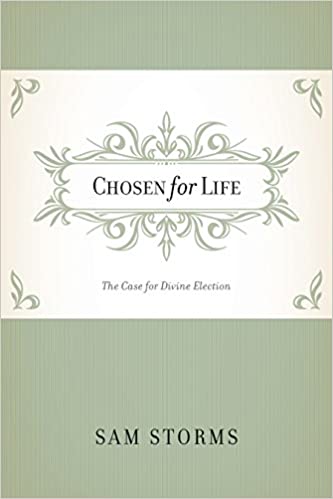A Brief Book Summary from Books At a Glance
By Jenny-Lyn de Klerk
Table of Contents
- What is Divine Election, and Why Is It So Controversial?
- The Arminian Concept of Election
- The Calvinistic Concept of Election
- Freedom of the Will (?)
- Faith and Repentance: Gifts of God or the Fruit of Free Will?
- Amazing Grace
- Unconditional Election (1): The Gospels and Acts
- Unconditional Election (2): The Epistles and Revelation
- Unconditional Election (3): Romans 9:1-13
- Unconditional Election (4): Romans 9:14-23 (1)
- Unconditional Election (5): Romans 9:14-23 (2)
- The Order of Salvation
- Crucial Questions Concerning Election (1)
- Crucial Questions Concerning Election (2)
- A Defense of Divine Election
Appendix A: Three Problem Passages
Appendix B: Who Can and Who Cannot Pray for God to Save the Lost?
Appendix C: The Divine Decrees
Overview
In Chosen for Life Storms aims to determine whether the Bible teaches the Calvinist, Arminian, or another view of election by examining historical and contemporary theological debates, biblical passages about election, and implications of these for the Christian life.
Summary
Chapter 1: What is Divine Election, and Why Is It So Controversial?
Storms recognizes that the doctrine of election is highly debated, but that these debates often arise from misunderstandings. Inaccurate caricatures of Calvinists as too cold and Arminians as too soft persist today. Calvinists and Arminians do not disagree that the Bible teaches the doctrine of election, but what the Bible says about the basis of this election. Historically, the answer to this question has been 1) a person’s good works (Pelagianism), 2) God’s foreknowledge of a person choosing to have faith (Arminianism), or 3) God’s sovereignty (Calvinism). The debate between Calvinism and Arminianism deals with whether faith and repentance come before or after election. Storms concludes by listing occurrences in the Bible of the concept of being elected or chosen.
Chapter 2: The Arminian Concept of Election
Though many Arminians value corporate election (which states God chose Christ, and thus those who are united to him—the church—are the elect), this chapter focuses on individual election (that God elects a person on the basis of his foreknowledge of that person choosing to have faith). The Arminian position does not teach election based on works, but election based on the individual’s choice, because faith is a gift from God. Arminians believe that this is the only way for God to be just in electing some but not all. Most Arminians also believe the doctrine of total depravity, and explain the human being’s ability to choose faith with the doctrine of prevenient grace (that God gives grace to make people able to choose). Some problems with prevenient grace are:
- If one denies prevenient grace but still holds to Arminianism, one must say that human beings can be saved without grace
- The doctrine of prevenient grace is not in the Bible
- Prevenient grace would give human beings something to boast about
- Prevenient grace temporarily elevates man’s will over God’s will
- God foreknows everything so prevenient grace makes no difference
- Prevenient grace does not solve the problem of God not electing all people (he still only elects some)
Arminianism distinguishes between God’s antecedent will (that all be saved) and consequent will (that those who accept God’s grace will be saved and those who do not accept his grace will not be saved) to say that his antecedent will is shown indiscriminately to all people. Thus, his antecedent will is not irresistible.
Jacob Arminius was a pastor who responded to William Perkins’ view of predestination. Arminius argued for prevenient grace, denied Pelagianism, and said that one can have assurance of present salvation but not future salvation because of the possibility of falling away from grace (thus making election conditional). Arminius’ followers wrote the Remonstrance in 1610 to present their view to government authorities, and Calvinists responded with the Counter-Remonstrance (also known as the Canons of Dort) in 1611. The latter won and Arminians were exiled and persecuted. Arminianism had a significant influence on Wesleyan, Pentecostal, and Nazarene denominations. . . .
[To continue reading this summary, please see below....]The remainder of this article is premium content. Become a member to continue reading.
Already have an account? Sign In
